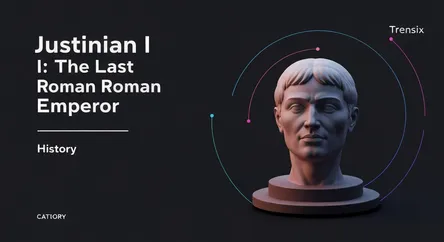History
Justinian I: The Last Roman Emperor

Explore the reign of Justinian I, the Byzantine emperor who reshaped Roman law, built the Hagia Sophia, and sought to restore the Roman Empire.
What is it?
Justinian I, also known as Justinian the Great, was the Byzantine (Eastern Roman) Emperor from 527 to 565 AD. Born to a peasant family, he rose to prominence under his uncle, Emperor Justin I, and became one of the most significant figures of late antiquity. His reign was marked by an ambitious project to restore the glory of the Roman Empire, known as renovatio imperii. This involved extensive military campaigns to reconquer lost territories in the West, including North Africa, Italy, and parts of Spain. Justinian's rule was also characterized by major architectural achievements and profound legal reforms.
Why is it trending?
Justinian's legacy remains a subject of great interest due to his monumental contributions to law and architecture. His most enduring achievement is the codification of a millennium of Roman laws into a single body of work, the Corpus Juris Civilis (Body of Civil Law). This compilation continues to influence modern civil law systems in many countries. Furthermore, his architectural program left an indelible mark on the world, most notably with the construction of the Hagia Sophia in Constantinople. His reign also faced immense challenges, including the devastating Nika riots, which nearly cost him his throne, and the catastrophic Plague of Justinian, one of the deadliest pandemics in history.
How does it affect people?
The impact of Justinian's reign extends to the present day. The legal principles organized in the Corpus Juris Civilis form the bedrock of the legal frameworks in much of Europe and beyond. Lawyers, judges, and lawmakers still indirectly engage with his legal legacy. His architectural vision, embodied by the Hagia Sophia, continues to inspire awe and stands as a testament to Byzantine engineering and art. As a ruler who presided over a period of immense cultural blossoming, military upheaval, and catastrophic plague, Justinian's story offers timeless lessons on leadership, ambition, and the resilience of societies in the face of crisis.